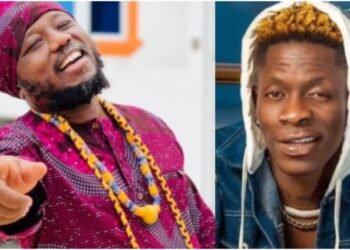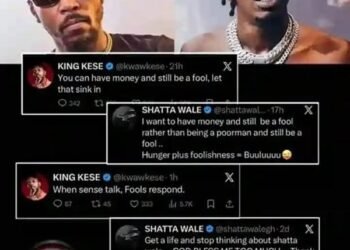Veteran Ghanaian music producer, Edward Nana Poku Osei, popularly known as ‘Hammer’, has disclosed how he wasn’t privy to marketing and making money from his works on digital music stores.
According to him, when he was approached by rapper Joey B to publish his works online, he brushed it off until he received a thorough education on the platforms available and what he could do to make money from them.
“Do you know who made me get on digital platforms? It was Joey B. Joey B called me someday and said, ‘Hammer, I’m not finding your works on Spotify and Apple Music, what should I do?’ And I’m like, what should I do with it? He said I need to put it on there.”
Hammer
Hammer mentioned that he refused the advice and kept on selling bread until Ghanaian singer, Worlarsi, began distributing his works on these sites for him.
Hammer revealed that the money he was making from the bread business made him see no reason to publish his works.
“I didn’t mind then. I was selling bread and that’s what I was eating. I bought three cars in one year. These were not small cars, I’m talking about my Jeep and others. The bread was good.
“So he told me that I needed to get my work online. So I was introduced by Worlasi to a distributor who then became my main distributor and that’s how I went on all these digital platforms.”
Hammer
Also, he lamented the common misconception in the music industry that tends to see music producers as just beat makers.
Hammer, known for shaping the sounds of many successful songs, expressed frustration that many artists he intended to work with would merely request a beat rather than engage in thorough recording sessions at his studio.
“I am struggling with my new album because I’m in an age where everyone is asking me to send them the beat, and I get confused. I am a producer, not a beatmaker. Come to me.
“Beatmakers do not have input on the song. My job as a producer, aside from making the beat, is to dictate, direct, and polish the whole music recording session and make sure everything is okay. That’s why in the credits, they say ‘song produced by so and so’, and not ‘beat made by so and so’.”
Hammer
‘No Girl Policy’

Hammer cautioned any artiste who intends to work with him not to bring a girl to the studio.
He opened up on how he relates with the artists he works with and the secret to how he produces magical sounds.
“I am a very detailed person. One thing everybody knows about me is ‘Don’t bring a girl to the studio,’ because when you come to my studio, you are a student.
“If you bring a girl to the studio to impress her and you’re not careful, I will check you like you’re a student and I won’t care whether or not there’s a girl there. So if you don’t want to be embarrassed, don’t bring anybody.”
Hammer
Hammer expressed that his dedication to his craft stems from his desire to ensure that both the artist and the song earn praise from the public.
He further added that such successes are only hindered by the ego and attitude of the artists in question.
“People feel intimidated when they’re recording with me because my job is to make you shine. No compromises… If you do something that is not good, I will tell you spot on. I need to make sure that when you go out there, nobody can diss you.
“It can cost you a lot if you come to my studio with your entourage and your ego. So leave it (your ego) at the door, take your paper and pen, and come and learn.”
Hammer
Hammer of ‘The Last Two’ is a distinguished Ghanaian record producer.
He is the founder and CEO of The Last Two Music Group and is credited with the rise of several prominent Ghanaian Hip-Hop and Hiplife artists, including Obrafour, Tinny, Kwaw Kese, Sarkodie, and Ayigbe Edem.
Hammer’s influence in the music industry has been significant, particularly in the popularization of Hiplife, a genre that blends Ghanaian cultural rhythms with hip hop.
READ ALSO: EC Petitioned to Withdraw its Directives to Police over Special Voters List























